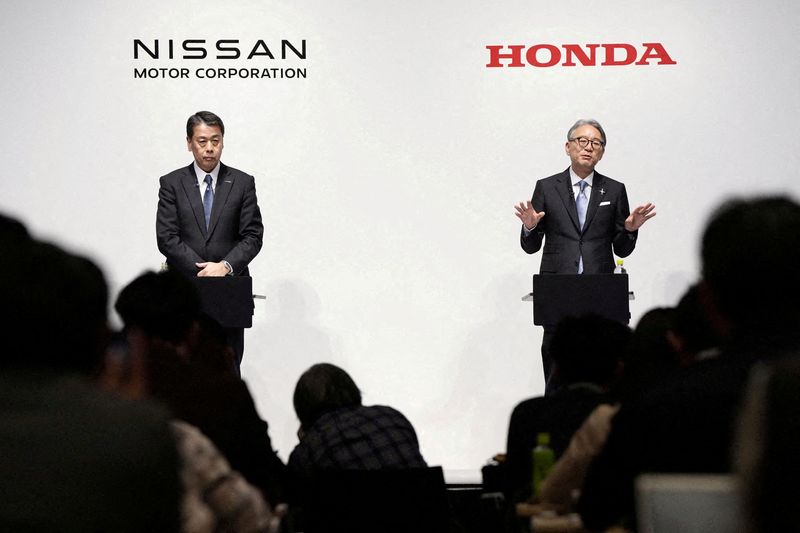By Maki Shiraki and Kantaro Komiya
TOKYO (Reuters) -Honda and Nissan have started talks toward a potential merger, they said on Monday, a historic pivot for Japan’s auto industry that underlines the threat Chinese EV makers now pose to some of the world’s best known car makers.
The integration would create the world’s third-largest auto group by vehicle sales after Toyota and Volkswagen. It would also give the two companies scale and a chance to share resources in the face of intense competition from Tesla and more nimble Chinese rivals, such as BYD.
The merger of the two storied Japanese brands – Honda is Japan’s second-largest automaker and Nissan its no. 3 – would mark the biggest reshaping in the global auto industry since Fiat Chrysler Automobiles and PSA merged in 2021 to create Stellantis in a $52 billion deal.
Smaller Mitsubishi Motors, in which Nissan is top shareholder, was also considering joining, the companies said. The chief executives of all three companies held a joint press conference in Tokyo.
“The rise of Chinese automakers and new players has changed the car industry quite a lot,” Honda CEO Toshihiro Mibe told the press conference.
“We have to build up capabilities to fight with them by 2030, otherwise we’ll be beaten,” he said.
The two companies would aim for combined sales of 30 trillion yen ($191 billion) and operating profit of more than 3 trillion yen through the potential merger, they said.
They aimed to wrap up talks around June 2025 and then set up a holding company by August 2026, at which time both companies’ shares would be delisted.
Honda has a market capitalisation of more than $40 billion, while Nissan is valued at about $10 billion.
Honda will appoint the majority of the holding company’s board, it said.
Combining with Mitsubishi Motors would take the Japanese group’s global sales to more than 8 million cars. The current No. 3 group is South Korea’s Hyundai and Kia.
Honda and Nissan have been exploring ways to bolster their partnership, including a merger, Reuters reported last week.
The two companies said in March they were considering cooperation on electrification and software development. They agreed to conduct joint research and widened the collaboration to Mitsubishi Motors in August.
Last month, Nissan announced a plan to cut 9,000 jobs and 20% of its global production capacity after sales plunged in the key China and U.S. markets. Honda also reported worse-than-expected earnings due to declining sales in China.
Like other foreign carmakers, Honda and Nissan have lost ground in the world’s biggest market China to BYD and other local brands that make electric and hybrid cars loaded with innovative software.


